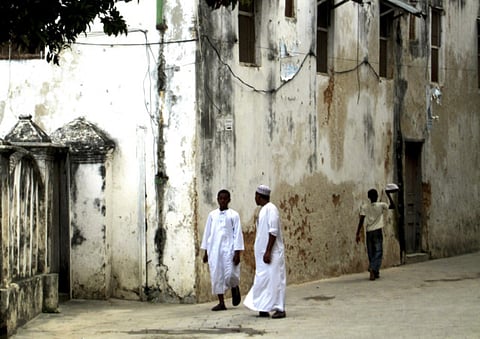Zanzibar's small islands are big on thrills
For a warm and friendly vibe, a pace that is unashamedly African and delicious food, come to Zanzibar

It is the place to choose if you have memories of days that went by when you sat on a plantation chair in a veranda, spoke on a black rotary dial telephone and watched someone clean freshly caught fish.
You will also be drawn if you are a history buff, for its mysterious reputation has been founded on a patchwork of spices, slaves, sultans and stars. It was here that Farrokh Bulsara lived before he became Freddie Mercury of Queen and journalist Henry Morton Stanley began his search for missionary and explorer David Livingstone. Sir Richard Burton and John Hanning Speke used it as their base when searching for the source of the Nile. It is the birthplace of Swahili and also where the world’s shortest war took place — the Anglo-Zanzibar War on August 27, 1896, which lasted from 9am to 9.40am.
If you are filled with nostalgia or wish to make memories, pack your bags and head to Zanzibar. There is no dearth of reasons with nature, culture, cuisine, wildlife and water sports thrown into the mix. Zanzibar has plenty to offer.
As one of those mythical names, everyone has heard of Zanzibar, but few can point it out on a map. This Indian Ocean archipelago is a part of Tanzania, separated from its mainland by a 20-minute flight or a two-hour boat ride. Once the seat of the Omani Sultanate, Zanzibar was a busy trade centre for spice, ivory and slaves and patronised by Arab, Persian, Malaysian, Indonesian, Indian and Chinese merchants alike. Today, it is one of the oldest East African cities and a World Heritage site where tradition and the slow pace of life try to vie with tourism and globalism.
Budget or luxury
Zanzibar is awash with idyllic experiences that range from budget to uber-luxurious. Zanzibar City is the capital and major metropolis on the island of Unguja, and in it is Stone Town, a maze of narrow streets lined with houses and stores, many featuring magnificently carved doors. Although it can rightfully claim to be a city, much of it is a slumbering paradise, dotted with mosques, temples and churches. There are clove and coconut plantations, street food and markets, elegant buildings and ramshackle mansions. At the heart of Stone Town are commercial streets lined with stores selling beads, shells, tie-dye clothes and curios.
If you stay in Stone Town’s many boutique hotels (Kisiwa House, Jafferji House,etc), you can be assured of character such as no other. During the day, there is the cacophony of cats, dogs, babies, traders and housewives, and at night, there is a more muted version. Rotund women wearing kangas (local dress) scurry down alleyways so narrow their arms could touch buildings on both sides, while children run in and out of schools. The kangas feature Zanzibari lore with proverbs printed on their hems.
More luxurious editions are located along Stone Town’s seafront, in other parts of Unguja island, or on neighbouring islands such as Chapwani and Mnemba. Budget options are aplenty and Zanzibar is synonymous with secluded honeymoon hideaways.
Stone Town’s most action-packed venues are the Darajani Market where chaos reigns and aromas of spices mingle with the stench of fish, and the Forodhani Gardens, a plaza that comes alive at sunset with vendors serving local delicacies. Pweza is grilled octopus and samaki wa kupaka is grilled fish; Zanzibari pizza is a rolled-up omelette-filled roti; mishkaki is Swahili-style kebab; and goat meat is boiled, baked or fried.
Zanzibar’s historic monuments include Kilele Square, the site of a former slave market; Palace Museum, home of the Al Busid dynasty; Peace Memorial Museum, home to David Livingstone memorabilia; Old Fort, used by Arabs to keep away the Portuguese; Aga Khan Mosque and its Gothic facade; Mtoni Palace, the 19th century birthplace of Arabian princess Seyyida Salme; and Beit Al Ajaib, the first building in East Africa to have electricity.
For visitors of any age, a trip to Prison Island (or Changu) makes magical memories. Small motorised boats quaintly named Mr Bean, Jambo and Facebook take you to the island, which is worth at least half a day of touring. Prison Island is famous for its giant Aldabra tortoises and a large prison that never served as one. The guide books never mention the smaller tortoises and peacocks on it or its flour-like white sands or about the beauty of the Indian Ocean when viewed from the rear entrance of the Prison Museum. But they exist and have to be experienced.
For animal lovers
Another day trip should be reserved for the Jozani Chwaka Bay National Park. Besides the vivid red colobus and blue Sykes’ monkeys, it has some stunning sea grass beds and majestic mangrove forests.
For beach lovers, some of the best options are Matemwe, Mangapwani, Pwani Mchangani, Kiwengwa, Uroa, Bwejuu and Nungwi. Pemba has diving, Mnemba Atoll has snorkelling, and Nungwi has waterskiing and wakeboarding. The fishing village of Kizimkazi offers swimming with the dolphins, and the channel between Zanzibar and Pemba offers big game fishing.
Zanzibaris are warm and friendly, their pace is unashamedly African, their food is delicious and their land is almost incomparable. It is only people in the know who acknowledge this archipelago as an exotic flavour in international travel. Someday it may even surpass Bali or Mali, but until then, you had best to head to this delightfully unspoilt destination where Africa, Arabia and India meet, and sit back to savour life, slowly.
Emirates, Kenya Airways and other airlines connect the UAE to Zanzibar. UAE agents such as Sharaf Travel can help you create personalised trips.
Sign up for the Daily Briefing
Get the latest news and updates straight to your inbox


